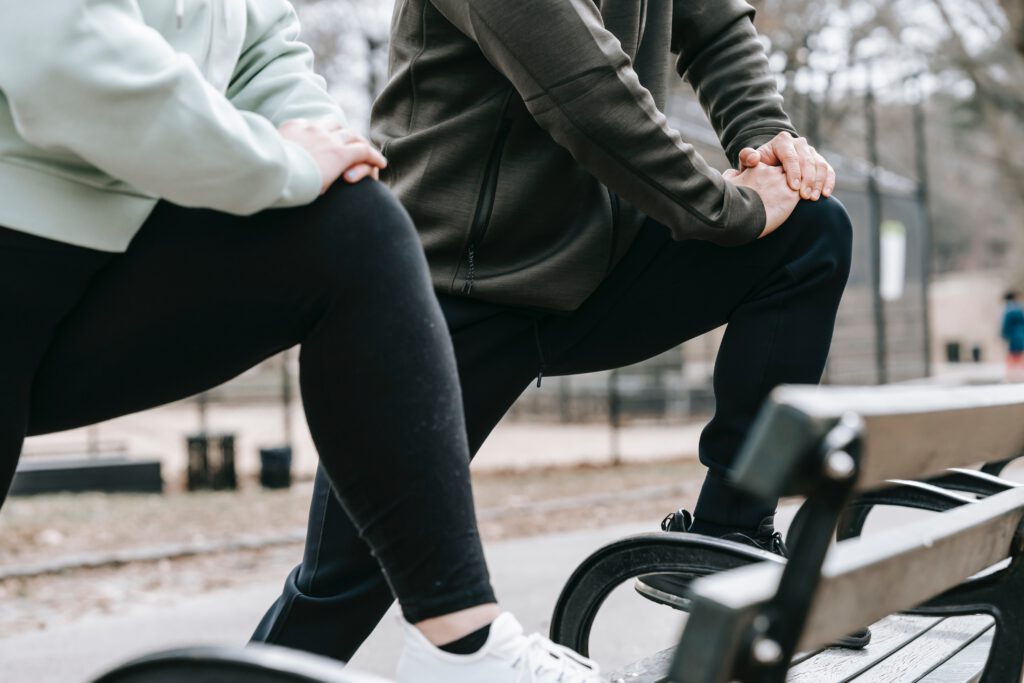Can I avoid the pain of arthritis?

A few thoughts to help us, the children, on the subject of arthritis.
Arthritis in knees and/or hips is, it would seem, inevitable for most of us. It is simply the result of wear and tear to cartilage over the years. Dr Ashwin Unnithan argues that it’s the result of a having had a good life. So it’s not something to feel bad about.
On the other hand, it would be good to do the best we can to prevent arthritis from limiting our lives. So what action can we take?
Dr Unnithan has been answering questions on a webinar through Surrey Total Health’s Facebook page, and offered some useful tips on facing the challenges of hip and knee arthritis in particular. While you can’t replace cartilage, you can potentially slow down its erosion, and manage the fallout.
Slowing arthritis
Whether or not you’re showing symptoms of arthritis, keep yourself active. It’s important to stay mobile while focusing on building up muscle strength. If you stop exercising, there’s a good chance you’ll put on weight and put yourself at risk of diabetes, heart issues and other medical problems.
Find out what you’re dealing with and how far it has progressed. There are various types of arthritis, such as osteoarthritis and rheumatoid arthritis, as well as other conditions such as osteoporosis, that could be the cause of hip and knee pain. Talk to your GP to find out what your challenge is, so you can work out the best way to address it.
Try supplements if you have mild to moderate arthritis. Glucosamine Sulphate and Chondroitin seem to have a beneficial effect, but need to be taken in the right strengths. These aren’t an instant fix, but need to be taken for at least six months before you feel the benefits. (Totally anecdotal, but I’ve been taking these supplements for longer than that and believe that my journey to problems with my knees has slowed considerably.) There also seems to be some debate about whether they affect blood sugar levels adversely.
There’s little evidence that turmeric prevents arthritis, but it does appear to help with inflammation.
What not to do
Don’t take over-the-counter painkillers long-term without talking to your GP to find out what is definitely causing your pain.
Don’t ignore swelling after exercise. Swelling of the knee is a sign of arthritis, and you will probably need to adjust your exercise programme. It may be that you need to cut down your running for example.
If you have to take a couple of days off after exercise, that’s likely to be a sign you’re pushing yourself too hard.
Don’t use a knee brace. It doesn’t help to build helpful muscle.
What sort of exercise?
Non-weight-bearing exercise that helps to build muscle strength is good, such as an exercise bike or yoga.
Build up muscle without putting pressure on the wrong areas. Static exercise using bodyweight to build muscle is good, but avoid squats for example. And in most cases your own bodyweight is enough, without adding extra external weights. If you do use weights, then repetitive movements with small weights is better than short bites of heavy lifting.
If you’ve always been a runner, you may not need to stop, but you do need to watch for pain and swelling. Don’t make sudden jumps in the distance you run, but build up gradually. And at any level, you need to be careful of the terrain you run on and wear properly fitted shoes.
Make a plan
There are a number of actions you can take if and when your arthritis becomes more painful. Making a plan with your GP is the best way forward. Actions you can discuss include:
- Changing your exercise programme
- Using anti-inflammatories
- Injections such as steroids or PRP
- Joint replacement
Joint replacement is usually the final option, but in most cases people can go back to living a normal life after a successful operation.
Further information
Versus Arthritis is a charity focused on living with arthritis.
The NHS is always a good go-to site for clear explanations of health conditions.
Surrey Total Health is a group of like-minded consultants who all hold positions within Surrey.
Find out about the history and use of hemp.
Disclaimer
Please don’t take this article as gospel. I’m not a health practitioner but gathered these insights from listening to experts. Your best step is always to talk to your GP.
You can watch the original webinar and others on the Facebook page.
Photo by Andres Ayrton from Pexels

